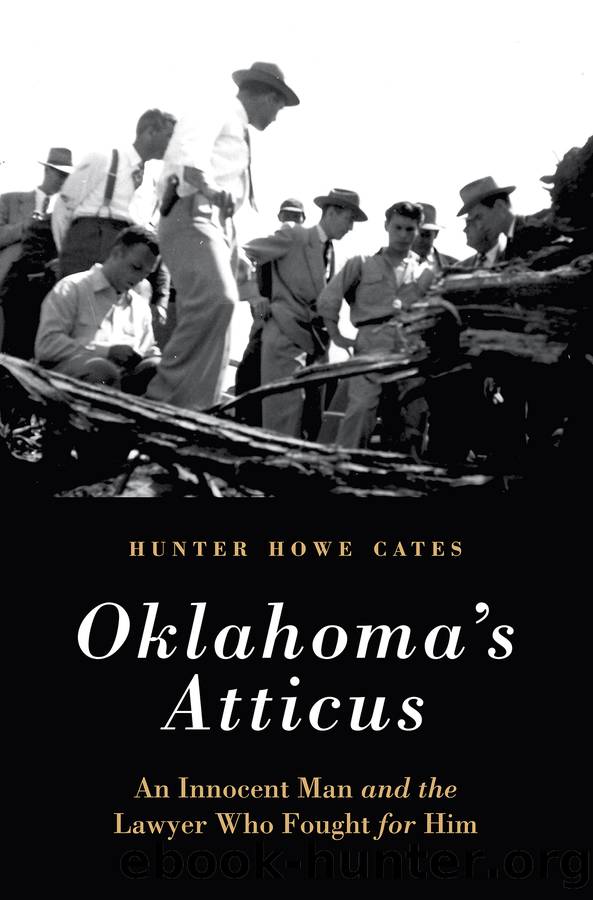Oklahoma's Atticus: An Innocent Man and the Lawyer Who Fought for Him by Hunter Howe Cates

Author:Hunter Howe Cates [Cates, Hunter Howe]
Language: eng
Format: epub
Tags: Nm, True Crime, Murder, Ok, Tx), United States, General, State & Local, history, Native American, Southwest (AZ; NM; OK; TX), HIS028000 History / Native American, TRU002000 True Crime / Murder / General, HIS036130 History / United States / State & Local / Southwest (az
ISBN: 9781496200907
Google: INuuDwAAQBAJ
Publisher: U of Nebraska Press
Published: 2019-11-01T23:49:51.081811+00:00
10
Changing the Conversation
Howe was alone. No one in the county government believed Buster was innocent. No one in the city government believed he was innocent. Most of the press and the majority of the public did not believe Buster was innocent. âEven I didnât believe in Busterâs innocence,â Howeâs wife, Imelda, said to the Tulsa World months later. âBut Bill was all alone and I couldnât let him know how I really felt.â
Howe was a man alone against a city, a county, perhaps even common sense. As far as the public was concerned, he was a fool at best and a charlatan at worst. After the weeks-long nightmare that was Phyllisâs disappearance and discovery, Tulsans wanted to put this tragedy behind them and Buster behind bars. Buster had confessed to killing the girl. Case closed. But now the story had flipped. Now Buster denied killing the girl and was even claiming the authorities had forced him to lie. The strange case of Buster Youngwolfe was not coming to a close anytime soon.
Following Busterâs public denial, Howeâs case got off to a rocky start. On Wednesday, April 8, Howe tried to prevent the county attorney and the sheriff from questioning his client any further. Howe claimed that the authorities had violated Busterâs constitutional rights by holding him for four days without charge and by forcing him to reenact the crime. Wheeler fought back, claiming he had no idea Howe was Busterâs attorney at the time of the reenactment. Perhaps displaying his sense of invulnerability, Wheeler said, âThe most you can say was violated was some moral or ethical standards.â
âI think Mr. Wheeler has very ably stated my case,â said Howe.
Only one opinion mattered here, and unfortunately for Howe, Judge Elmer Adams did not agree with the public defender. According to Judge Adams, Wheeler had violated a âcanon of the bar associationâ by communicating with Buster without Howe present but had not violated the Constitution. Howeâs appeal to prevent the county from speaking to Buster was denied.
Howe asked for Wheelerâs personal assurance that it would not happen again, but he was denied that as well. Wheeler said there was no reason for the court to forbid the county from unethical acts because âwe have done nothing unethical.â Wheeler was contradicting himself in the press, and only Howe was willing to call him on it. In any event, the county attorney had little incentive to cede any ground. He was winning. For added measure, Wheeler said that Howeâs petition was âridiculous.â
âIt is not ridiculous under what has transpired,â said Howe.
Tensions between the two sides simmered from the start and for good reason. To prove Busterâs innocence, Howe had to prove that the county attorney was incompetent at best and corrupt at worst. From the county attorneyâs vantage point, he was no longer fighting just to put a murderer behind bars but also to protect his reputation.
Tension spilled beyond the courtroom. Clifton Brooks, Busterâs brother-in-law, arrived to work at a rendering plant and received a threatening note.
Download
This site does not store any files on its server. We only index and link to content provided by other sites. Please contact the content providers to delete copyright contents if any and email us, we'll remove relevant links or contents immediately.
Harry Potter and the Goblet Of Fire by J.K. Rowling(3107)
Never by Ken Follett(2923)
Unfinished: A Memoir by Priyanka Chopra Jonas(2922)
Machine Learning at Scale with H2O by Gregory Keys | David Whiting(2335)
The Man Who Died Twice by Richard Osman(2317)
Fairy Tale by Stephen King(2107)
Will by Will Smith(2085)
Rationality by Steven Pinker(1783)
The Storyteller by Dave Grohl(1676)
The Dark Hours by Michael Connelly(1590)
The Dawn of Everything: A New History of Humanity by David Graeber & David Wengrow(1584)
The Stranger in the Lifeboat by Mitch Albom(1568)
Cloud Cuckoo Land by Anthony Doerr(1455)
New Morning Mercies: A Daily Gospel Devotional by Paul David Tripp(1410)
Friends, Lovers, and the Big Terrible Thing by Matthew Perry(1355)
The Becoming by Nora Roberts(1349)
Crying in H Mart by Michelle Zauner(1340)
Einstein: His Life and Universe by Walter Isaacson(1327)
A Short History of War by Jeremy Black(1313)
